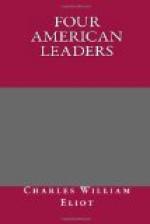There are innumerable details in which Emerson anticipated the educational experiences of later generations. I can cite but two of them. He taught that each age must write its own books; “or rather, each generation for the next succeeding. The books of an older period will not fit this.” How true that is in our own day when eighty thousand new books come from the press of the civilized world in a single year! Witness the incessant remaking or re-casting of the books of the preceding generation! Emerson himself has gone into thousands of books in which his name is never mentioned. Even history has to be re-written every few years, the long-surviving histories being rather monuments of style and method than accepted treasuries of facts. Again, contrary to the prevailing impression that the press has, in large measure, stripped eloquence of its former influence, Emerson taught that “if there ever was a country where eloquence was a power, it is the United States.” He included under eloquence the useful speech, all sorts of political persuasion in the great arena of the Republic, and the lessons of science, art, and religion which should be “brought home to the instant practice of thirty millions of people,” now become eighty. The colleges and universities have now answered in the affirmative Emerson’s question, “Is it not worth the ambition of every generous youth to train and arm his mind with all the resources of knowledge, of method, of grace, and of character to serve such a constituency?” But then Emerson’s definition of eloquence is simple, and foretells the practice of to-day rather than describes the practice of Webster, Everett, Choate, and Winthrop, his contemporaries: “Know your fact; hug your fact. For the essential thing is heat, and heat comes of sincerity.... Eloquence is the power to translate a truth into language perfectly intelligible to the person to whom you speak.”
* * * * *
I turn next to some examples of Emerson’s anticipation of social conditions, visible to him as seer in his own day, and since become plain to the sight of the ordinary millions. When he accumulated in his journals the original materials of his essay on Worship, there were no large cities in the United States in the present sense of that term. The great experiment of democracy was not far advanced, and had not developed many of its sins and dangers; yet how justly he presented them in the following description: “In our large cities, the population is godless, materialized,—no bond, no fellow-feeling, no enthusiasm. These are not men, but hungers, thirsts, fevers, and appetites walking. How is it people manage to live on, so aimless as they are? ... There is faith in chemistry, in meat and wine, in wealth, in machinery, in the steam-engine, galvanic battery, turbine wheels, sewing-machines, and in public opinion, but not in divine causes.”




